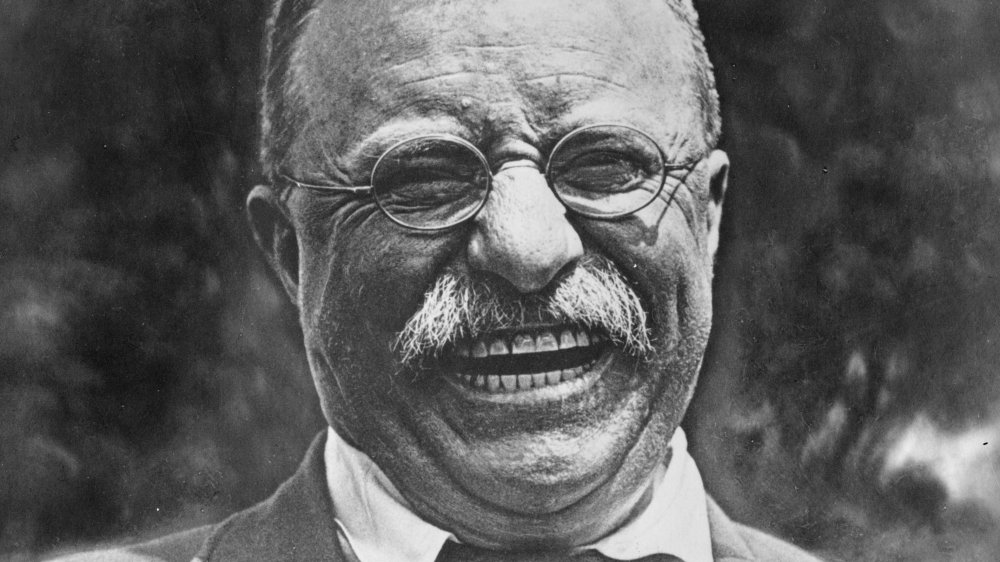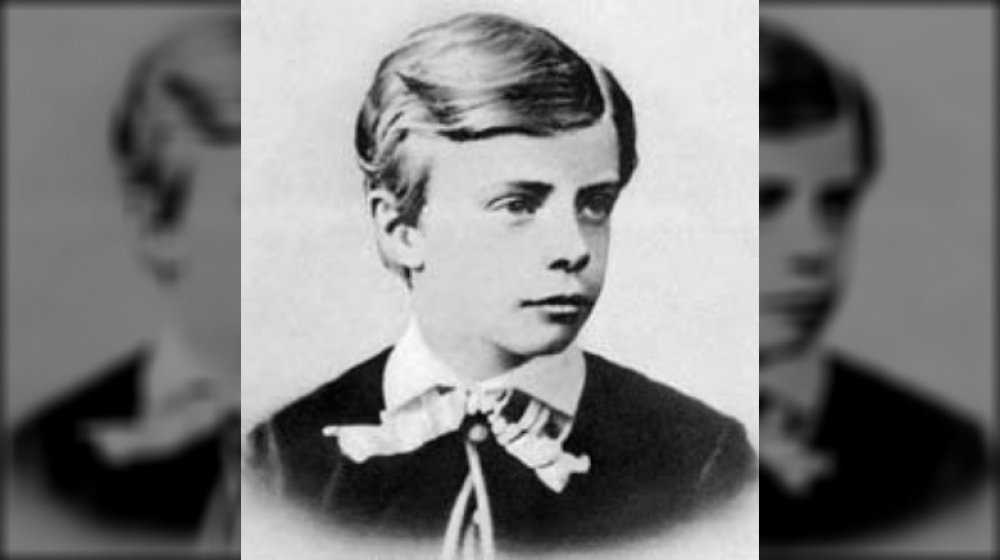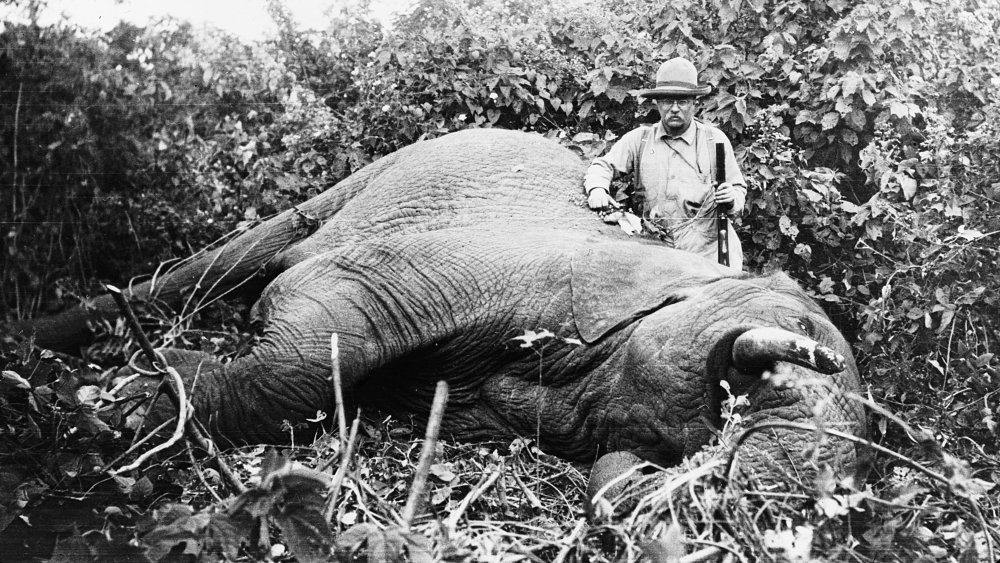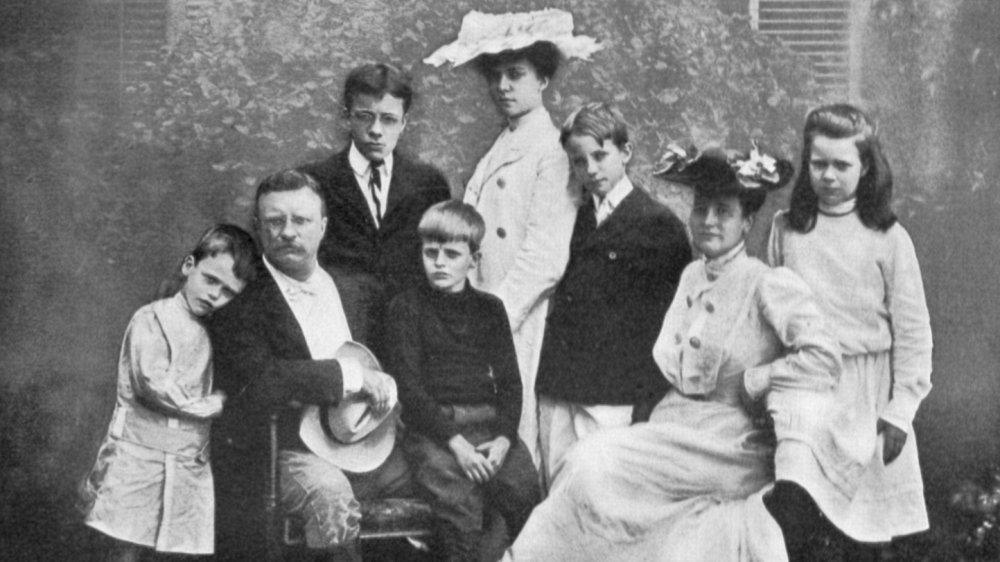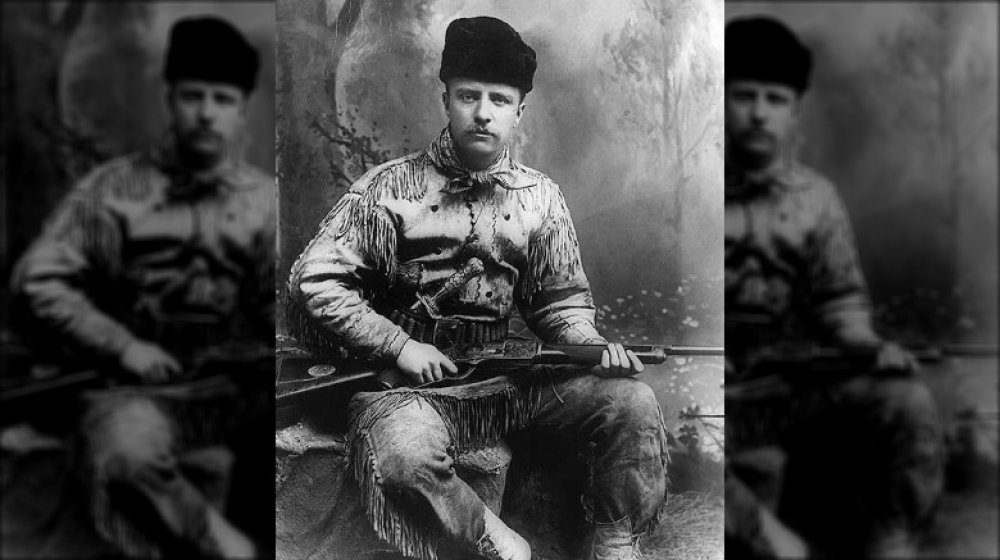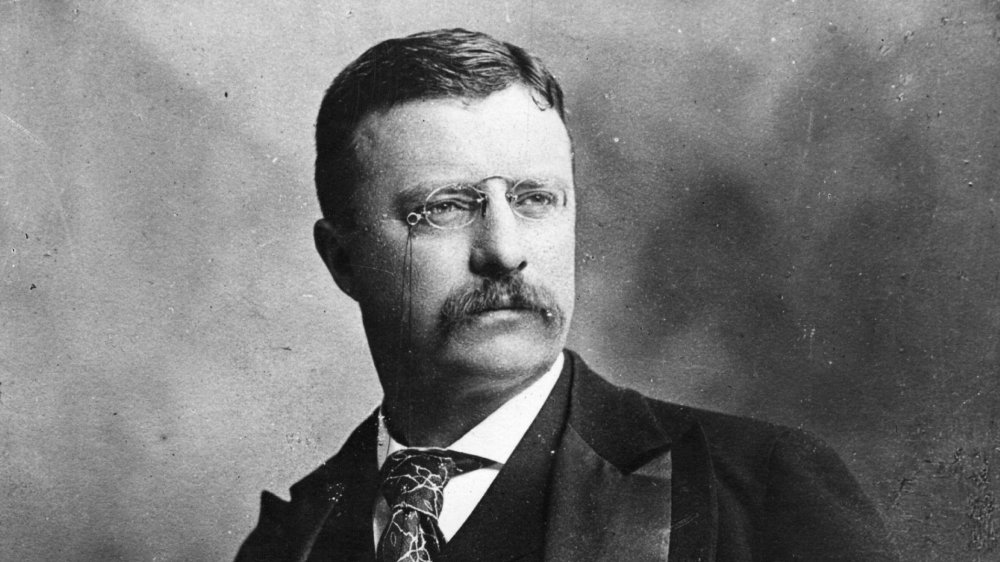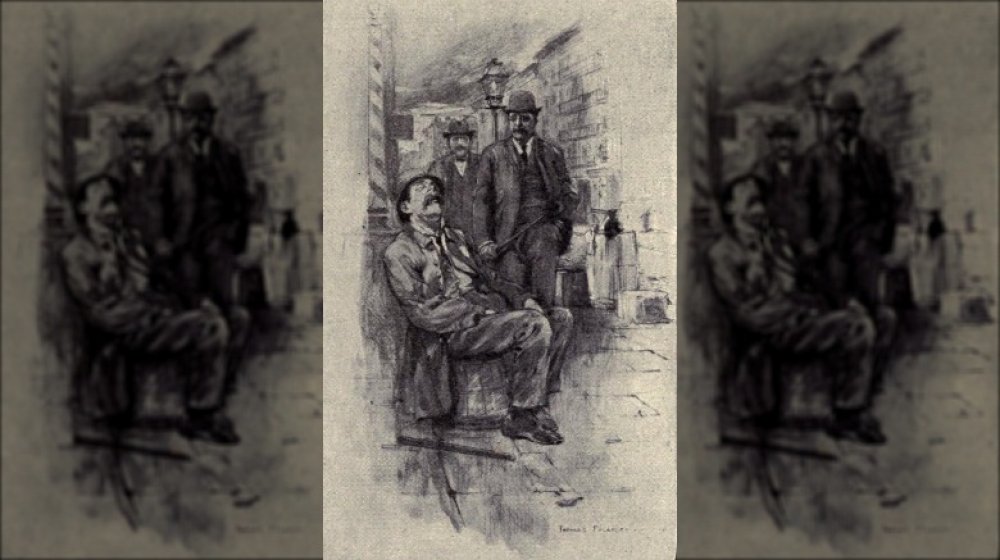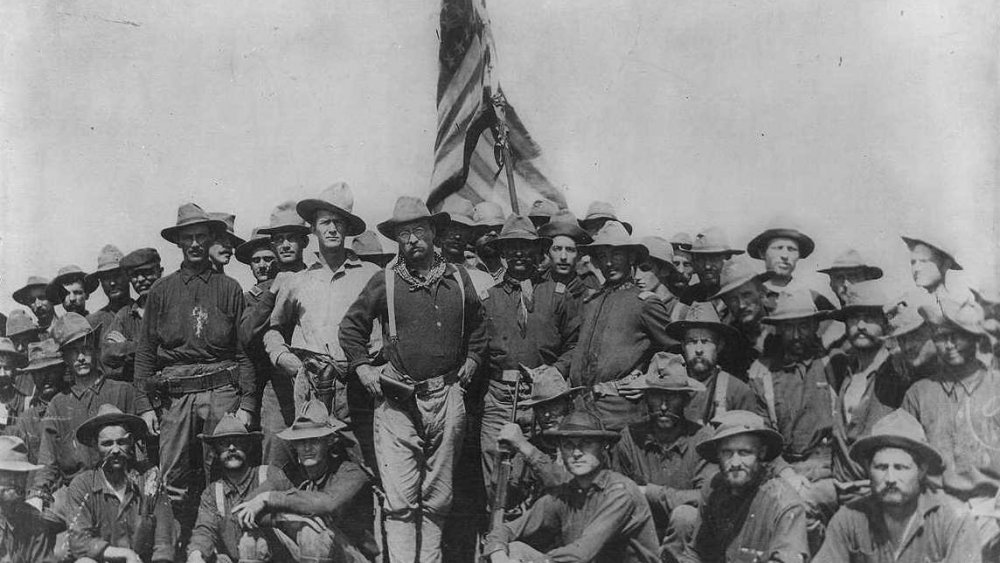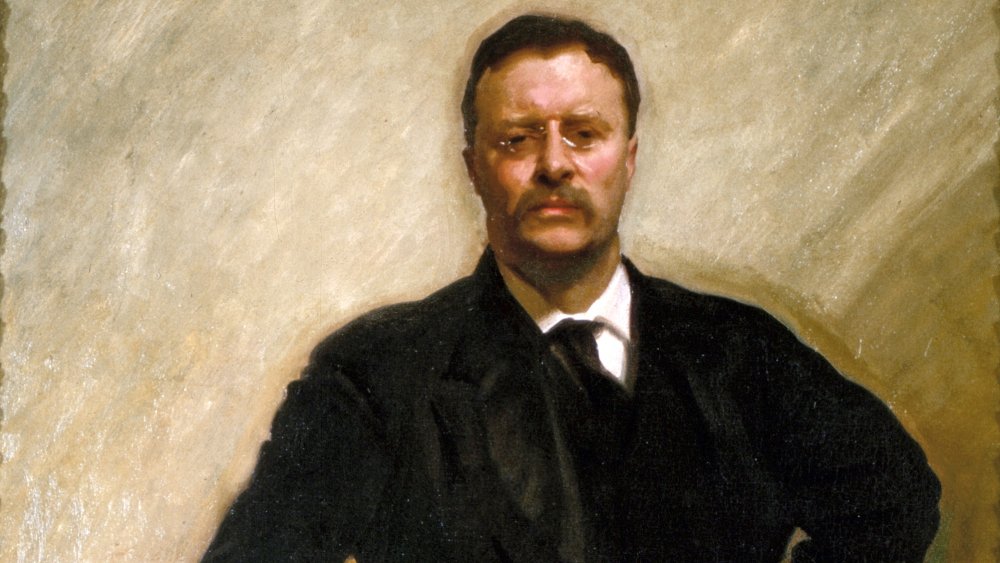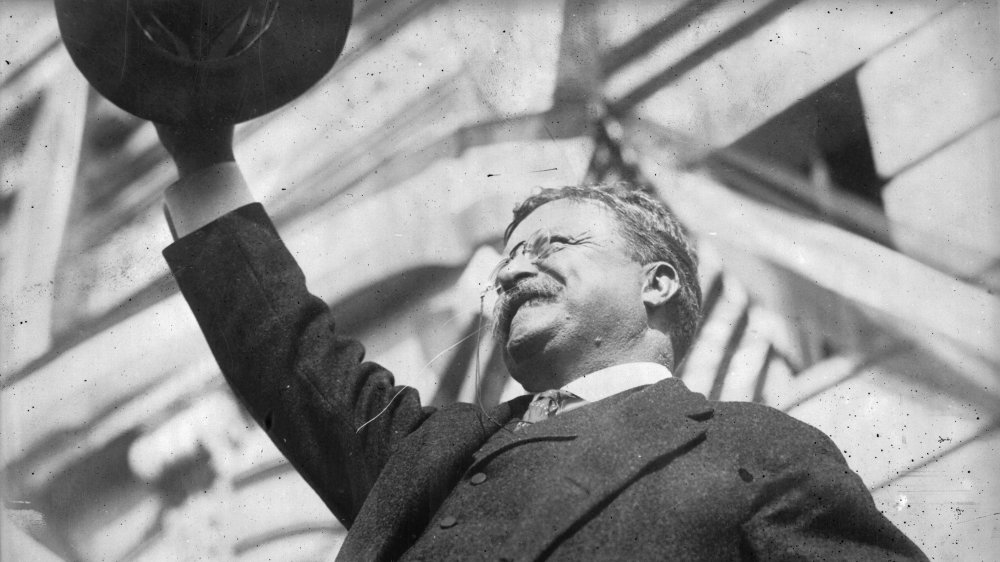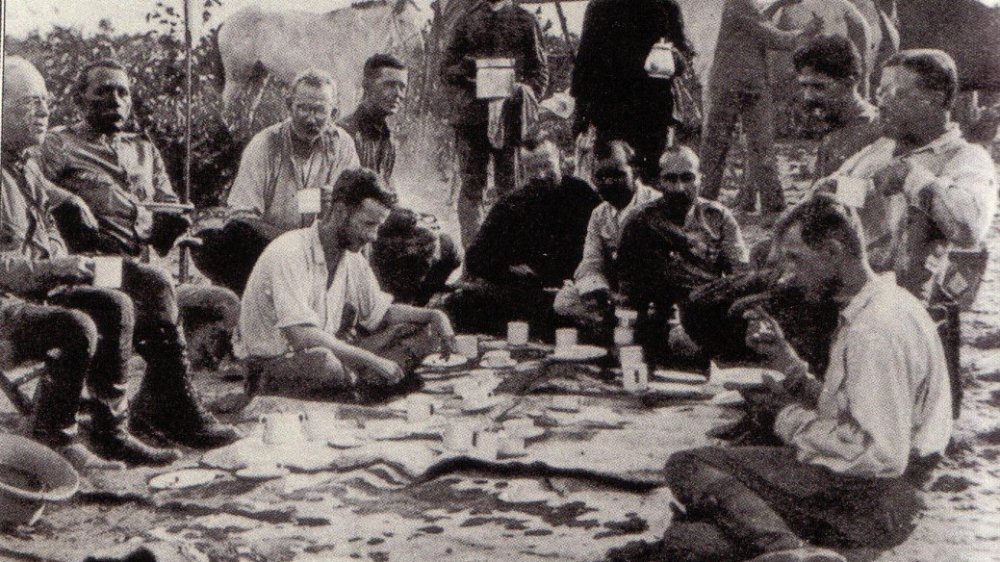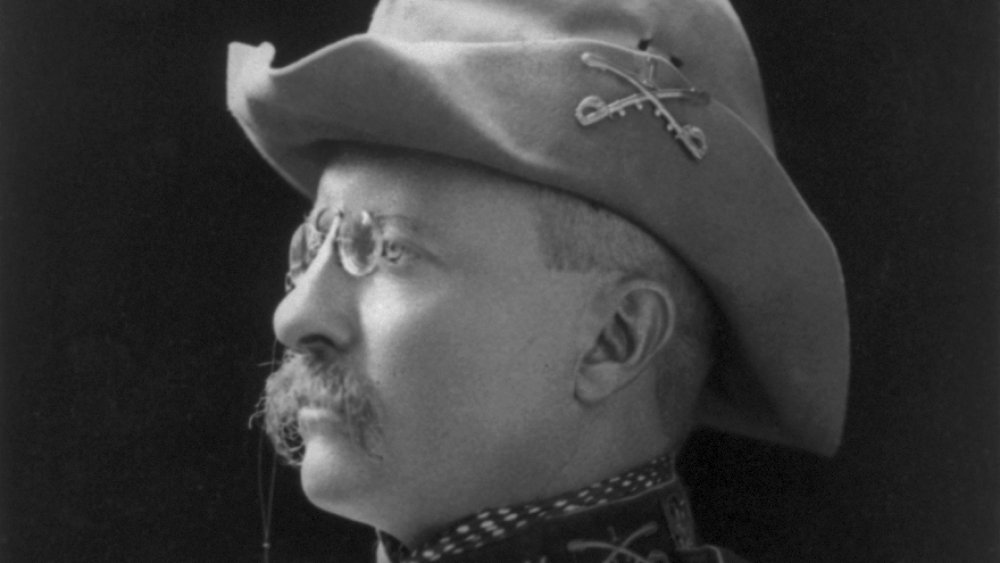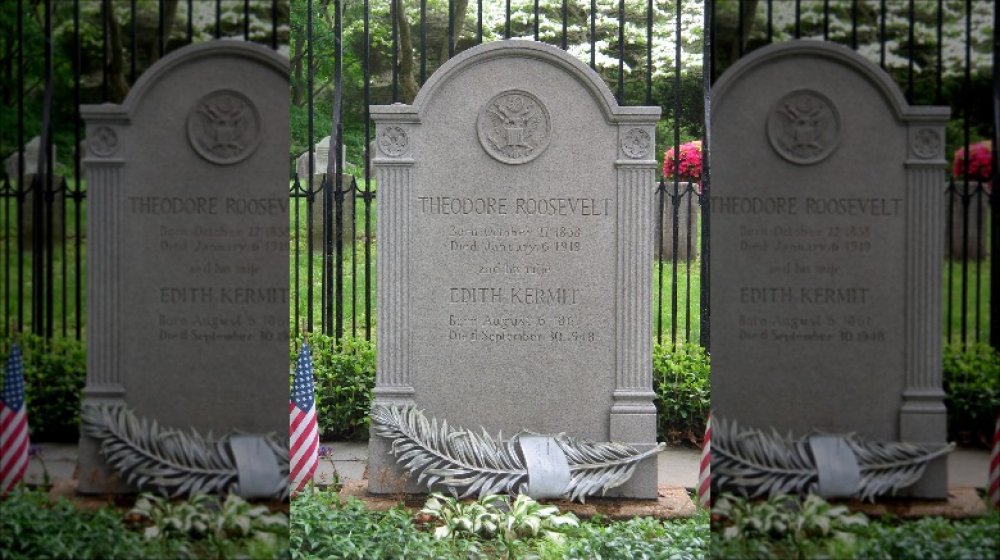The Insane True Story Of Teddy Roosevelt
Theodore Roosevelt, the 26th president of the United States, played many roles in his life, some of them seemingly contradictory. He was a war hero and a Nobel Peace Prize winner. He was a big game hunter and a passionate conservationist. He was a vigorous athlete and a studious intellectual, a New York aristocrat and a Badlands cowboy. The man was a legislator, a commissioner, naval secretary, governor, vice president, president, trust-buster, and a Bull Moose. All in all, he had a pretty busy life, but that's how he liked it.
But even that list can't convey the sheer craziness of the life of the Old Lion, who boxed his eyes out, stuffed seal heads, and got protested by criminals for being too good at crime-fighting. While no single article could possibly contain it all, here are just a few of the details of the truly insane life of Theodore Roosevelt.
Theodore Roosevelt invented his own fighting style to smash asthma in the face
Theodore Roosevelt is known as one of America's most masculine presidents, famous for his love of sport, adventure, the outdoors, and vigorous activity. He believed deeply that the only way to lead a happy and successful life — not only for the individual, but for a nation — was through constant toil and effort, a philosophy he expounded on at length in one of his most famous speeches, 1899's "The Strenuous Life." So full of vim and vigor was Roosevelt that he was more than once described as a "locomotive in human pants."
But it wasn't always that way. As Vice explains, when Roosevelt was young, he suffered from severe asthma, and as a result, he was rather sickly and weak. This made him timid and a frequent target for bullies. However, following a trip with his father to the Alps, young Roosevelt learned that the exertion actually lessened the effects of his previously debilitating asthma. And so he dedicated his life to the exercise of his body in order to smash bullies — and asthma — in the face. Roosevelt soon developed a passion for boxing, which he competed in while at Harvard (though, it should be noted, not for the official team), and would also end up adding wrestling and judo to the mix, creating his own form of combat that would predate MMA by almost a century.
He had a taxidermy museum as a kid
Theodore Roosevelt absolutely loved the great outdoors. In fact, his proudest achievement as president was his work in conservation and increasing federal protections for public land and wildlife. He created the Forest Service and established numerous national parks, game preserves, national forests, bird sanctuaries, and national monuments. And of course, his famous compassion for animals is what led to the teddy bear being named after him. (He was, of course, also famously a big game hunter, but many of his hunting expeditions were tied to scientific study and conservation efforts. The point stands that he was fascinated with animals, anyway.)
However, his love for nature had a pretty unusual start: seeing a dead seal when he was seven years old. According to Teddy Roosevelt Live, Roosevelt's interest in zoology was sparked by seeing a seal's corpse at a local market. For some reason, he was allowed to take the seal's head, which he taxidermied. Soon he was capturing, killing, and stuffing more animals, which he put together as the "Roosevelt Museum of Natural History," a makeshift presentation of these animals that he would, at age 12, donate to an actual museum. By his early 20s, Roosevelt donated over 600 preserved bird skins to the Smithsonian, which, let's be honest, is a super gross thing to collect.
He lost his wife and mother on the same day
Arguably the darkest day in Theodore Roosevelt's life came to him at a relatively young age. As History explains, in 1884, Roosevelt was 26 years old and serving in the New York state legislature. Just two days before, his wife, Alice Hathaway Lee, whom Roosevelt had married on his 22nd birthday, had given birth to a daughter, Alice Lee Roosevelt. However, on February 14, 1884, Roosevelt was called home from the legislature to find out that his mother had died of typhoid fever. If that weren't enough, eleven hours later in the same house, Roosevelt's beloved wife died of an undiagnosed kidney failure that her pregnancy had hidden.
Roosevelt was devastated at losing his mother and wife within hours of each other. The page for that day in his diary contains merely a big "X" and then the words, "The light has gone out of my life." Overwhelmed by grief, Roosevelt left baby Alice in the custody of his sister while he went west to mourn. He would resume raising his daughter three years later, and by the time he was in the White House, Alice would become a celebrity for her outspoken nature and scandalous independent streak. In one striking example following her father's time in office, she got herself banned from the Taft White House for burying a voodoo doll of the first lady on the White House lawn.
He quit politics to become a cowboy
Early in his life, things were pretty rough for Theodore Roosevelt. In addition to losing his wife and mother on the same day, he eventually grew disgusted with politics. His success as a New York legislator saw him begin to emerge on the national stage during the presidential election of 1884, fighting for progressive candidates at the GOP National Convention. But when the quagmire of national politics led him to having to compromise his ideals and lose the support of other reformers, it's perhaps no surprise that Roosevelt said, "What if I were a cowboy instead?"
As the Theodore Roosevelt Center says, Roosevelt's desire to maintain a strenuous life and to overcome his grief led him to (temporarily) retire from politics and head to the Badlands of North Dakota, where he'd purchased some land in 1883. He was afraid the American frontier would soon disappear forever, and he wanted to establish himself as a for-real cowboy while he still had the chance. And to be fair, he totally did it. While in the Dakotas, Roosevelt's accomplishments included stopping stampedes, rounding up cattle for months at a time, catching robbers and thieves, and punching out a drunken, loudmouth gunslinger in a saloon. All extremely legit. After he was satisfied that he'd successfully transformed from a New York "dude" into a Dakotas cowpuncher, Roosevelt sold off most of his ranch land and returned home in the late 1880s.
Theodore Roosevelt gained enemies by actually doing his job
Upon returning from the Old West in 1886, Theodore Roosevelt married his second wife, Edith Kermit Carow, and was almost immediately re-entrenched in politics. Republican leaders asked him to run for mayor of New York City, which he agreed to. He finished in a relatively close third place, but he feared his political career was over. However, his powerful campaign speeches in support of presidential candidate Benjamin Harrison in the election of 1888 gained him the favor of the Republican party and led him to being appointed to the U.S. Civil Service commission. Traditionally, this job had been what is known as a sinecure — one where you sit back and draw a cushy paycheck without actually doing anything. It probably won't surprise you to learn that this isn't how Roosevelt rolled.
As the Office of Personnel Management explains, Roosevelt took his position very seriously and fervently believed in a merit-based system of equal opportunity within the civil service system. He also pursued reform with the anti-corruption zeal for which he's famous. He enthusiastically rooted out fraud and abuse within the system — ironically causing him to clash with the party leaders who argued for his appointment — including calling for the arrest of postal employees who were buying votes for Benjamin Harrison, the very man who appointed Roosevelt as Civil Service Commissioner in the first place.
Criminals protested against him
Theodore Roosevelt's reputation as a reformer of irrepressible enthusiasm and belligerence led to him being reappointed as Civil Service Commissioner in 1892. What's more, this reputation led to his being appointed to a position on the board of New York City Police Commissioners by a reform-minded mayor. The New York police at this time (and, you know, other times) had a reputation for being a pit of corruption and graft, and no one was more eager to clean it up than Roosevelt.
According to ThoughtCo., Roosevelt's "bull in a china shop" approach to rooting out corruption brought him into considerable conflict with the powerful political bosses in New York (and caused him to receive at least two letter bombs). Besides his institution of recruiting police officers based on merit rather than political affiliation, Roosevelt pushed to enforce the law that closed saloons on Sundays, the only day when many working people could socialize. Corrupt political bosses took advantage of people's anger at Roosevelt to lead large protests against him, but this backfired. Roosevelt's good humor at the people's insults toward him at these demonstrations garnered him significant goodwill. The next year, he gained back much lost support with the way he managed a heatwave in the city with care.
Roosevelt's team of misfits on San Juan Hill
As assistant secretary of the Navy, Theodore Roosevelt strongly favored Cuban independence from Spain, and he was willing to fight a war with the Spanish Empire to get it. After the battleship called the USS Maine was blown up in Havana Harbor by what was officially declared (but still never definitively proven) to be a Spanish mine, Roosevelt got his wish. The explosion of the Maine and the 262 sailors inside was decreed a Spanish act of war, and the ten-week Spanish-American War began in 1898. This brief conflict would prove to be the stage on which Roosevelt launched himself into the national spotlight.
As the National Parks Service explains, once the war began, Roosevelt resigned from his position with the Navy and formed a volunteer regiment to go fight in Cuba. Sorting through applications from literally tens of thousands of volunteers, Roosevelt assembled a ragtag team made up of Ivy League athletes, polo players, cowboys, Native Americans, miners, prospectors, and hunters who would come to be known as the Rough Riders. Despite this unlikely combination of men, the Rough Riders rode to fame under Roosevelt's leadership at Kettle Hill in San Juan Heights, where Roosevelt (the only member of his cavalry unit actually on a horse) led a series of charges that saw the US flag flying over San Juan Hill. Roosevelt would declare that day "the great day of my life."
Theodore Roosevelt became president on a mountaintop
Following the national fame Theodore Roosevelt had attained as a war hero, he found himself being asked to run for governor of New York by the very same party bosses who'd led protests against him as police commissioner. He won by a mere 17,000 votes, but nevertheless, those same party bosses pressured national Republicans to nominate Roosevelt as President McKinley's running mate in the 1900 election following the death of the previous vice president. Roosevelt was reluctant to accept the nomination, but he won it unanimously.
And then came the Pan-American Exposition in 1901. As History explains, this was a World's Fair in Buffalo, New York, showing off the innovations of the newly-birthed 20th century. McKinley was there to give a speech, and anarchist Leon Czolgosz was there to make the president not alive anymore. With the assassin's bullets in his stomach, McKinley was taken to the Expo's president's home, where doctors gave such an optimistic update on his condition that Roosevelt decided to return to camping in the Adirondacks, where he'd been at the time of the shooting. However, a week later, McKinley's condition worsened severely, and he died, leaving the man he'd only reluctantly accepted as his running mate as president. Roosevelt became president while climbing a mountain, which feels incredibly on brand for him.
He was an incredibly active president
Theodore Roosevelt's presidency is known for his bold reforms, his progressive policies that saw increased business and safety regulations from the federal government, his conservation efforts, his expansion of the United State's naval power to protect its newly acquired colonial empire, building the Panama Canal, and his attempts to establish a "Square Deal" for every American, rich and poor alike. But even with all that going on, Roosevelt's dedication to the strenuous life wouldn't let something like work stop him from having some fun.
According to History, Roosevelt maintained his outdoorsman's lifestyle even while living in the White House. He was known to take the presidential yacht out for a quick sail on the Potomac River and even to drop his pants and skinny-dip in the river when he felt like cooling off. He would also take target practice by shooting at twigs and stumps out in Rock Creek Park, where he would regularly hike and climb cliffs. Being president didn't slow down his appetite for boxing, and he would regularly spar against former pro fighters until he got hit so hard in the face that he went blind in his left eye. But quitting boxing didn't mean he quit fighting. This was when he took up judo — a sport less likely to blind you — eventually earning a third degree brown belt.
Roosevelt almost died in the Amazon
Theodore Roosevelt was an immensely popular and relatively young president, and so a third term would likely have been a lock for him if he'd decided to run in 1908. However, Roosevelt believed in term limits and had made a promise not to run a third time. Instead, he handpicked William Howard Taft as his successor and then headed out for a year-long safari in Africa. But when Taft broke from Roosevelt's progressive policies, the Old Lion decided to run against Taft as a third-party candidate, creating the Progressive Party, aka the Bull Moose Party. You might remember this campaign, as it's the one where Roosevelt got shot, but the speech in his pocket slowed the bullet.
Anyway, Roosevelt and Taft both lost to Woodrow Wilson (arguably one of the worst presidents in American history), and so, as History explains, TR tried to drown his sorrows by taking his son and exploring one of the deadliest sections of the Amazon, an uncharted tributary known as the "River of Doubt." After numerous members of their party died, Roosevelt himself came down with an infection so bad that he lost a quarter of his body weight and could only recite the first two lines of the poem "Kubla Khan." He proposed that he would commit suicide rather than slow his group down any further, but his son wouldn't let him. Despite the infection in his leg and the bullet still in his chest, he soldiered on and barely survived.
He fought to fight in World War I
Theodore Roosevelt wasn't a man who worried about slowing down, as he tried his darnedest to go and fight in World War I at the age of 58. According to Smithsonian magazine, the relationship between Roosevelt and Woodrow Wilson had been something of a roller coaster. Wilson had defeated TR in 1912, but Roosevelt had been impressed by some of Wilson's more progressive reforms. But the hero of the Spanish-American War wouldn't stand for the cautious Wilson's initial policy of non-involvement in the First World War and called him "the lily-livered skunk in the White House." But by 1917, America had entered the war, and so Roosevelt hoped to work his way back into Wilson's good graces.
What he wanted was to re-form the Rough Riders nearly 20 years after his historic charge on San Juan Hill. In a 45-minute talk with Wilson at the White House, Roosevelt requested to return to the Army as commander of a volunteer division that would be part of an expeditionary force to France. He pressured the secretary of war to allow this and even lobbied Congress to pass legislation allowing privately assembled volunteer divisions to fight alongside the regular army in Europe. While Congress authorized Roosevelt to put together four divisions, Wilson shot him down and instead assembled his own American Expeditionary Force without Roosevelt. TR never forgave Wilson for this slight.
Death had to ambush Theodore Roosevelt
Theodore Roosevelt fully intended to run for president yet again in 1920 after Woodrow Wilson's second term, and Republican leadership fully expected him to run as well after his rift with Taft and the party had mostly healed. However, as the National Constitution Center explains, Roosevelt died unexpectedly in his sleep at age 60 in January 1919. His physical condition had deteriorated due to the accumulated effects of a lifetime of "jungle diseases." Furthermore, Roosevelt had gotten worse following the death of his son, Quentin, in the very war that Roosevelt himself was forbidden from fighting in. Ultimately, it was a blood clot in his lungs that got him. Woodrow Wilson's vice president said that, "Death had to take Roosevelt sleeping, for if he had been awake, there would have been a fight."
There would, however, be a Roosevelt on the ballot in 1920: Theodore's fifth cousin, Franklin Delano Roosevelt, who ran as the vice presidential candidate on the Democratic ballot. That time, Franklin would lose pretty handily to the Republicans' compromise candidate, Warren G. Harding. However, in 1933, the younger Roosevelt would have more success and become the first president to continue his cousin's progressive reforms, turning Theodore's Square Deal into a New Deal. He would also do something TR never managed — earn a third (and even a fourth) term.
